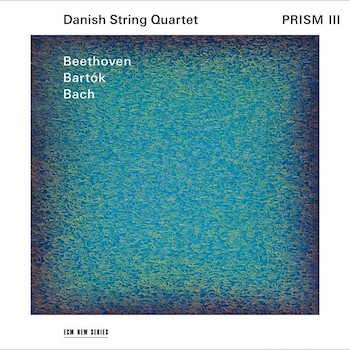Classical Album Review: Danish String Quartet’s “Prism III” — Exceedingly Fine, Probing, and Exciting
By Jonathan Blumhofer
This disc stands comfortably in the company of Beethoven and Bartók performances by the Emerson, Tákacs, Alban Berg, and Juilliard Quartets.

The Danish String Quartet’s (DSQ) survey of Bach fugues, Beethoven quartets, and Beethoven-influenced masterpieces is back. And Prism III offers a conspicuously attractive lineup of pieces, pairing Beethoven’s String Quartet in C-sharp minor (no. 14) with Béla Bartók’s First Quartet and a radiant reading of the C-sharp-minor fugue from Book One of Bach’s The Well-Tempered Clavier.
Of course, putting Beethoven and Bartók together is usually a safe bet. Here it proves a particularly wise one: the blend of contrapuntal and rustic elements in each quartet jump out and there’s a feeling of shared musical character in both works that defies temporal boundaries.
The DSQ’s account of the Beethoven is wonderfully balanced: the group’s sound is perfectly weighted and their ensemble winningly flexible. As a result, the music’s textures and architecture are laid out with remarkable transparency. The outer-movement fugues are commendably lean and well structured. In the central variations, the DSQ’s playing is both compellingly free and direct; the concluding variations’ dynamics are realized with the utmost delicacy. And the ante-penultimate Scherzo brims with personality.
A similarly taut attention to dynamic nuance and articulative detail mark the DSQ’s take on Bartók’s Quartet no. 1. Their approach to the fugal first movement is lush and expansive, reveling in the music’s harmonic richness but never at the expense of rhythmic purpose or the direction of the musical line. The second movement’s syncopated figures and hemiolas dance nimbly while the finale’s plenty vigorous, highlighted by a terrifically folksy account of the movement’s development section.
As in the Beethoven, the excellence of the DSQ’s Bartók performance is anchored in the group’s superb ensemble playing. Their responsiveness to the music and the resulting “aliveness” of these performances are — more than just matters of right tempos, intensity of tone, and shared expressive vision (all of which, by the way, are evinced in these readings) — fundamentally, a reflection of the Quartet’s preternatural rapport.
Put another way, any number of capable musicians can play this music well. This disc is more than that: exceedingly fine, probing, and exciting. It stands comfortably in the company of Beethoven and Bartók performances by the Emerson, Tákacs, Alban Berg, and Juilliard Quartets.
Jonathan Blumhofer is a composer and violist who has been active in the greater Boston area since 2004. His music has received numerous awards and been performed by various ensembles, including the American Composers Orchestra, Kiev Philharmonic, Camerata Chicago, Xanthos Ensemble, and Juventas New Music Group. Since receiving his doctorate from Boston University in 2010, Jon has taught at Clark University, Worcester Polytechnic Institute, and online for the University of Phoenix, in addition to writing music criticism for the Worcester Telegram & Gazette.

Great review, Jonathan. Thank you.